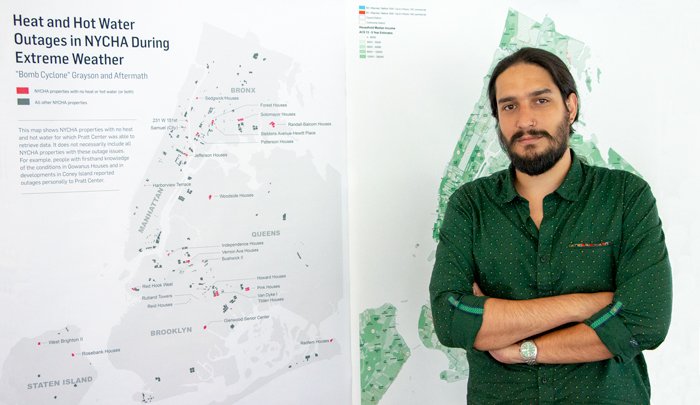
Pratt Center
In Conversation: Democratizing Data

The Democratizing Data initiative at Pratt Center equips community-based organizations to access essential neighborhood and citywide information in order to tell their community’s unique stories. We also train staff and leaders at local groups to engage strategically with data to sharpen programming, fundraising, and advocacy efforts and participate with insight and confidence in complex public processes. Pratt Center's Planner/GIS Specialist, Sadra Shahab, sat down to talk with us about why we need data democratization, not just open data, and what that looks like in specific neighborhoods.
Pratt Center: There’s been a movement toward “open data” in recent years, making government data more available to the public. Is this what Pratt Center means by democratizing data?
Sadra: President Obama signed the United States’ first open data law in 2014, and the New York City Council passed an open information law in 2012. These are common sense laws that basically say, if the government is collecting data with taxpayer money, the public should have access to it. But democratizing data is about more than access to data.
For example, some agencies just publish their data as a PDF file, but PDF’s are not “machine readable,” meaning they don’t allow you to run analysis of the data. This is the case with rent stabilized units in New York City. To get this data, John Krauss, who’s a fellow open data advocate, had to design a scraper that downloads the PDFs from the Department of Finance website, reads them, and turns them into Excel sheets.
So, data democratization starts with making data publicly available and in a format that allows analysis. But it’s also about knowing what to do with that data. Up until a few years ago PLUTO data [NYC’s property ownership and zoning dataset] would cost you up to $1,500 annually for all five boroughs. In 2013, after a lot of advocacy, the City made PLUTO free so anyone can download it. But having access to PLUTO doesn’t necessarily mean community-based organizations can analyze it. You need a strong computer and software which is pretty expensive. Even if you use open source software, you still need to pay someone who knows how to use it, which is not cheap.
A few years back, Pratt Center was looking at all these barriers faced by community-based organizations and came up with the Neighborhood Data Portal, which touches the whole spectrum of data democratization, from providing data, data information and knowledge of data to giving access to tools for putting this data together, running analysis, and making maps.
Pratt Center: Can you give some examples of how communities are using data in interesting ways?
Sadra: There are a handful of neighborhoods across the city facing rezonings and Pratt Center has been working with them to effectively advocate for what they need in their negotiations with the City.
In the case of Bushwick, the community board and community-based organizations like Make the Road came together about 5-6 years ago to talk about preserving the character of the neighborhood and to make sure folks won’t be displaced by new developments. Pratt Center and ANHD did a lot of analysis, projecting how many affordable or market rate housing units would come to Bushwick based on different zoning scenarios. And these analyses have enabled Make the Road to negotiate with City Planning to make sure the zoning they propose for Bushwick will be more closely aligned with what the neighborhood needs.
After the rezoning of East New York in 2016, Cypress Hills Local Development Corporation wanted to negotiate community benefit agreements with developers in their community to ensure they procured building materials and hired locally. They needed to understand the ecosystem of retailers and contractors so we made an online interactive tool so CHLDC could pinpoint the location of these businesses online, and then tell developers where to find them. Having that kind of data and mapping ability allowed them to more effectively negotiate agreements with developers
Pratt Center: Does every community-based organization need a data/GIS person?
Sadra: Sometimes community-based organizations need to create a plan or platform, but it’s a one-off project, so they rely on non-profits like Pratt Center for these services. I would like to see every community-based organization have access to a tool that is custom designed for them, that considers their size, their missions, and is tailored to their program needs. If these types of tools existed, I would be less worried about data analysis and skill sets. I think it’s partially on people who are developing tech or advocating for data access to understand the situation, and come up with tools that anyone can use regardless of their skillset.
PC: Could you talk about the Trump administration’s proposed citizenship question on the upcoming census and why it’s a threat to data democratization?
Sadra: I’ve been involved in advocacy work on this issue because of how it would affect my own Iranian community. There is a well established pattern in this administration of discrimination based on where people are from, starting all the way back with the Muslim travel ban. They have created a political environment in which a lot of brown and black communities don’t trust the government, and even research by the U.S. Census Bureau shows that asking this question would hinder responses to the survey. Groups like Pratt Center rely on accurate census data to understand existing conditions and to design policy. This citizenship question would jeopardize our ability to understand trends and project what future needs will be.
Attend the Neighborhood Data Portal Training on August 7 from 12-2
On August 7 from 12-2 pm, Pratt Center will offer a free training on how you and your organization can maximize Pratt Center’s Neighborhood Data Portal (NDP) to visualize program data in an impactful way and encourage data-responsive program design. REGISTER